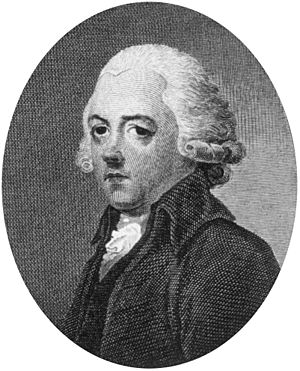William Falconer (writer) facts for kids
William Falconer (born February 23, 1744 – died August 31, 1824) was an important English doctor and writer. He was also a Fellow of the Royal Society, which means he was part of a very respected group of scientists.
Contents
The Early Life of William Falconer
William Falconer was born in Chester, England, on February 23, 1744. He was one of two sons. His father, also named William Falconer, was a lawyer in Chester.
Becoming a Doctor: Education and Training
William studied medicine at the University of Edinburgh in Scotland. He earned his first medical degree (M.D.) there in 1766. After that, he went to Leyden, a city in the Netherlands, to attend more lectures from famous doctors. He received another M.D. degree there in 1767.
In the same year, 1767, he became a licensed doctor with the Royal College of Physicians. Soon after, he was appointed as a physician at the Chester Infirmary, a hospital in his hometown.
Moving to Bath and Later Career
Dr. Falconer built a successful medical practice in Chester. Then, in 1770, he moved to Bath, Somerset, a city famous for its natural hot springs. He quickly became very successful there too.
In 1773, he became a Fellow of the Royal Society (F.R.S.). This is a big honor for scientists and scholars. In 1784, he was chosen as a physician for the Bath General Hospital, where he worked until 1819. He also became an honorary member of the American Academy of Arts and Sciences in 1800.
William Falconer passed away in Bath on August 31, 1824. He was buried nearby. His wife, Henrietta, had passed away earlier in 1803. He had one son, Thomas Falconer.
William Falconer's Writings and Contributions
Dr. Falconer was known for his wide knowledge and clear thinking. He wrote many articles and books on various subjects, especially medicine and natural history.
Key Medical Works
Many of Falconer's writings focused on health and medicine. He often wrote about the Bath Waters, which are natural hot springs used for healing.
- Treatises on Bath Waters: He wrote several books about the Bath Waters. These included "An Essay on the Bath Waters" (1770) and "A Practical Dissertation on the Medicinal Effects of the Bath Waters" (1790). These books explained how the waters could help with different illnesses.
- Gout and Chronic Diseases: In 1772, he published "Observations on Dr. Cadogan's Dissertation on the Gout and all Chronic Diseases." This showed his interest in long-term health problems.
- Poison and Diet: He also wrote about specific health concerns, such as "Observations and Experiments on the Poison of Copper" (1774) and "Observations on some of the Articles of Diet and Regimen" (1778). These works explored how food and other substances affect health.
- Influence of Passions: In 1788, he wrote "A Dissertation on the Influence of the Passions upon Disorders of the Body." This important essay won him a special gold medal. It looked at how emotions can affect physical health.
- Health for Farmers: He cared about the health of different groups of people. His "Essay on the Preservation of the Health of Persons employed in Agriculture" (1789) gave advice to farmers.
- Epidemics and Illnesses: Falconer also studied outbreaks of disease. He wrote about the "Epidemic Catarrhal Fever," also known as the Influenza, that appeared in Bath in 1782 and again in 1803.
- Hip Joint Diseases: In 1805, he published "A Dissertation on the Ischias; or the Diseases of the Hip Joint." This work earned him a silver medal from the Medical Society of London.
Other Interesting Writings
Beyond medicine, Dr. Falconer had many other interests.
- Natural History: He collected and wrote about ancient texts on natural history in his "Miscellaneous Tracts and Collections relating to Natural History" (1793).
- Ancient Voyages: He translated "Arrian's Voyage round the Euxine Sea" (1805), which was an ancient account of a sea journey.
- Biblical Studies: He also wrote about religious topics, such as "Observations on the Words which the Centurion uttered at the Crucifixion of our Lord" (1808).
William Falconer was a very active writer and thinker, contributing to both medical knowledge and other areas of learning during his lifetime.
 | Madam C. J. Walker |
 | Janet Emerson Bashen |
 | Annie Turnbo Malone |
 | Maggie L. Walker |


